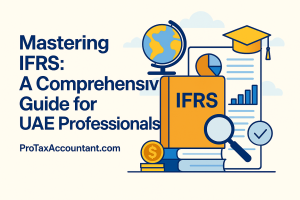When it comes to UAE corporate tax, one principle that often catches attention is the disallowance of deductions for expenses incurred in deriving exempt income.
This policy ensures a fair and balanced approach by aligning exemptions with related expenses.
In this blog, I’ll walk you through the details in simple terms, provide examples, and share how this impacts your financial planning. Let’s dive in!
Symmetry in Tax Exemptions
The UAE’s tax system is based on a symmetrical exemption principle. What does this mean?
Simply put, if a certain income is exempt from corporate tax, any expenses directly tied to earning that income are also non-deductible.
This ensures that businesses don’t get double benefits by claiming deductions on expenses for income that’s already tax-free.
For example:
- If you earn exempt dividend income, the professional fees spent to acquire those shares won’t be deductible when calculating taxable income.
To better understand, check out this comprehensive guide on UAE corporate Tax.
What Expenses Are Non-Deductible?
Here are the key types of non-deductible expenditures:
Direct Expenses:
- Professional Fees: Costs like consultancy fees for acquiring shares that yield exempt income.
- Due Diligence Costs: Expenses incurred during the evaluation of a company that generates exempt dividends.
- Commissions: Payments related to the purchase of assets generating exempt income.
- Transfer or Sale Costs: Expenditures on selling or transferring a Participating Interest.
Capitalization of Costs:
If you’re acquiring a Participating Interest, the associated costs must be capitalized. This means adding them to the investment’s acquisition cost instead of deducting them.
However, any depreciation or amortization of these capitalized amounts is also non-deductible.
Exceptions to the Rule
As with most tax rules, there are exceptions:
- Interest Expenditure: Interest costs may still be deductible, subject to the General Interest Deduction Limitation Rule.
- Specific Provisions: If a specific clause in the Corporate Tax Law permits the deduction, it overrides the general rule.
Want to know more about deductible expenses? Check out our detailed breakdown of non-deductible expenses.
Apportioning Mixed Expenses
Sometimes, expenses relate to both taxable and exempt income. In these cases, you’ll need to apportion the costs:
| Type of Expense | Taxable Portion | Exempt Portion |
|---|---|---|
| Office Rent for Investment | Deductible | Non-Deductible |
| Professional Fees | Deductible | Non-Deductible |
| Administrative Costs | Deductible | Non-Deductible |
By splitting expenses proportionately, you ensure compliance while optimizing your tax benefits. Use tools like our breakeven analysis calculator to simplify this process.
Real-Life Examples
Let’s bring these rules to life with some examples:
- Professional Fees:
- You hire a consultant to purchase shares in a company whose dividends are exempt from tax.
- The consultant’s fees are non-deductible because they’re directly tied to exempt income.
- Due Diligence Costs:
- While evaluating a company for acquisition, you incur legal and auditing fees.
- These fees are non-deductible if the dividends from the acquisition are exempt.
- Sale of Participating Interest:
- If you sell shares in a company and incur brokerage fees, these costs cannot be deducted if the sale relates to exempt income.
Need personalized guidance? Contact us to speak with an expert.
Why This Matters for Your Business
Understanding these rules helps you:
- Avoid Errors: Misclassifying expenses can lead to penalties or audits.
- Plan Effectively: Knowing which expenses are non-deductible ensures accurate financial forecasting.
- Optimize Tax Benefits: Proper apportionment can maximize your deductions where applicable.
We’ve helped businesses like yours navigate these complexities. Explore our affordable corporate tax accountant services to stay ahead.
Practical Tips for Compliance
- Maintain Detailed Records:
- Keep receipts and invoices for all expenditures.
- Use tools like our online accounting services for seamless record-keeping.
- Work with Experts:
- Collaborate with accountants who understand UAE Corporate Tax.
- Consider outsourcing to professionals. Learn why accounting outsourcing is trending in Dubai.
- Use Technology:
- Simplify calculations with tools like our UAE Corporate Tax Calculator.
- Stay Updated:
- Tax laws evolve. Regularly review changes to ensure compliance.
Final Thoughts
Navigating the rules around non-deductible expenditures for exempt income can be challenging, but it’s crucial for businesses in the UAE.
By understanding these principles, maintaining accurate records, and working with experienced professionals, you can ensure compliance while optimizing your financial strategies.
Let us help you simplify your corporate tax journey. Learn more about our affordable corporate tax services or contact us today to get started.
Additional Resources:
- Understanding EBITDA: A Key Metric for Operational Performance
- Online Accounting Services in the UAE: Reduce Cost by 60%
- Ultimate Guide to Hiring a Bookkeeping Service in Dubai
Visit our blog for more insights into UAE tax compliance.





